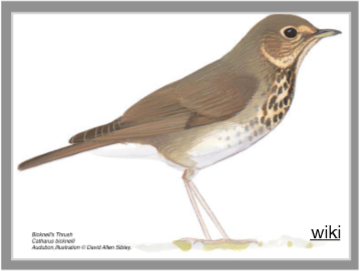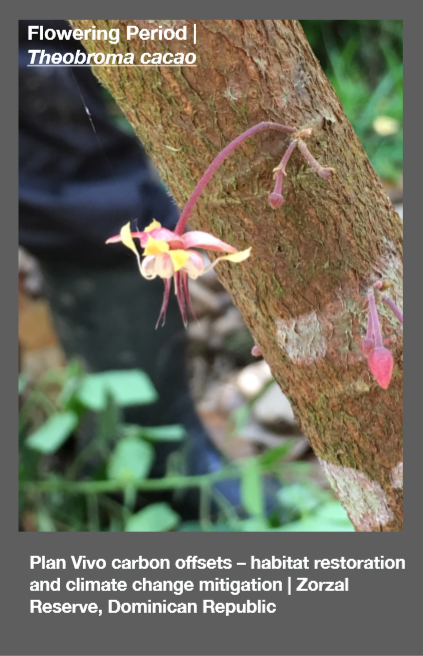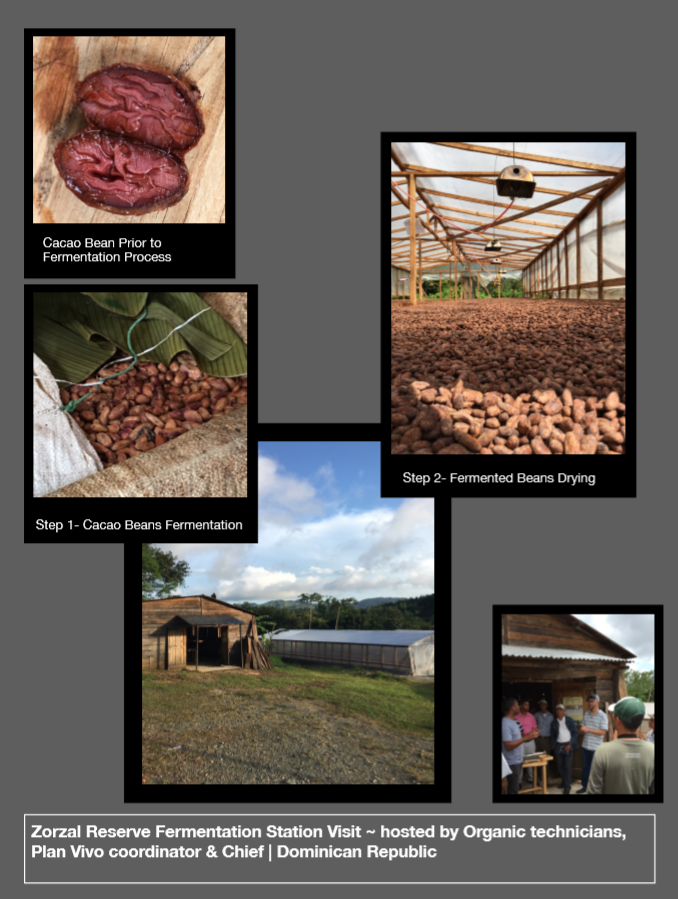Maple Tree Forests Branching out with a Cacao Forest Garden
Article by Christine Laliberté, 19 October 2017
ChocoSol Traders is a tree-to-bar chocolate maker social enterprise based in Toronto (https://chocosoltraders.com/). ChocoSol buys fermented cacao beans directly from cacao producers in Mexico, Ecuador, and the Dominican Republic (DR). At the shop, the ChocoSolista team crafts different lines of chocolate bars using stone ground, whole food artisanal methods. One of the “Fino Line” flavours featured is called Bird Sanctuary. This appellation salutes the Hispaniola region of northen Dominican Republic which is where the Zorzal - Agroforestry System is located, a first of it’s kind for this country (http://zorzalcacao.com/). This region is the the winter habitat of the Bicknell Thrush.

Look up in the Spring and depending upon what part of north eastern North America you are in you may observe a flock of Bicknell Thrushes moving along the Atlantic ocean during their migration. In the summer this small bird migrates to the vast Laurentia forest within southeastern Quebec and Vermont.(http://www.audubon.org/). Like the Bicknell Thrush, I was also born in a maple forest region. I feel that we are sharing a similar ritual; we are both “secretive forest singer[s].”

Made with 85% cacao from the Zorzal Reserve, this is my favorite mini bar made at ChocoSol. Bird Sanctuary reveals a distinct level of chocolate, expresses a balance of acidity and suggests a subtle nutty & fruity flavor. The added sea salt represents the Atlantic Ocean, the area covered by these birds during their seasonal migration. Also, the maple sugar crumble used to sweeten the bar on the back is a call out to the forest gardens of the North that provide food and habitat for these endangered birds.
Let me invite you to read the story of how I met a network and chain of artisans, technicians, ecologists and farmers who have devoted their lives to create a sustainable cacao product chain. Specifically, my article will focus on these four contributors:
MICHAEL SACCO - ChocoSol Founder, Toronto, CA
Dr. CHARLES KERCHNER- Zorzal Reserve Co-Founder & Artisanal Cacao Farm Operations Chief, DR GREG D’ALESANDRE - Chocolate Sourcer & Co-Owner at Dandelion Chocolate, CA, USA
CYNTHIA JONASSON - Chocolatier & Master Chocolate Maker Teacher at Dandelion Chocolate, CA, USA
 While interning at ChocoSol Traders a member of the ChocoSolista Team, Rebecca Jacobs, once told me an idyllic story about the existence of a bird sanctuary. She described that there are two countries involved in this migratory route with an ocean separating its distinct winter and summer habitats. The story which inspired the name for “Bird Sanctuary” chocolate bar has the charm of a fairy tale but the narrative has peaked my curiosity about ethical chocolate sourcing. Moreover, I was interested in getting a better understanding of ChocoSol’s horizontal trading business relationships with their producers. Horizontal trade is an invitation ”to participate in an intercultural dialogue and movement to create a socially-just, equitable, & ecological food system” (https://chocosoltraders.com/). As a result of the generous help of Michael Sacco (TEDxWaterloo - Michael Sacco - 2/25/10) I was able to connect with Dr. Charles Kerchner (http://zorzalcacao.com/), a ZorzalCacao producer and was able to visit a small forest garden cacao reserve in the DR. The purpose of my trip was to also explore my enthusiasm for sustainable agro-ecology and to see with my own eyes how cacao is grown and how such an innovative agroforestry project could benefit the community and help preserve the ecosystem. ChocoSol was the first international buyer to purchase the carbon credit Zorzal beans in 2014, (http://www.cepf.net/news/top_stories/).
While interning at ChocoSol Traders a member of the ChocoSolista Team, Rebecca Jacobs, once told me an idyllic story about the existence of a bird sanctuary. She described that there are two countries involved in this migratory route with an ocean separating its distinct winter and summer habitats. The story which inspired the name for “Bird Sanctuary” chocolate bar has the charm of a fairy tale but the narrative has peaked my curiosity about ethical chocolate sourcing. Moreover, I was interested in getting a better understanding of ChocoSol’s horizontal trading business relationships with their producers. Horizontal trade is an invitation ”to participate in an intercultural dialogue and movement to create a socially-just, equitable, & ecological food system” (https://chocosoltraders.com/). As a result of the generous help of Michael Sacco (TEDxWaterloo - Michael Sacco - 2/25/10) I was able to connect with Dr. Charles Kerchner (http://zorzalcacao.com/), a ZorzalCacao producer and was able to visit a small forest garden cacao reserve in the DR. The purpose of my trip was to also explore my enthusiasm for sustainable agro-ecology and to see with my own eyes how cacao is grown and how such an innovative agroforestry project could benefit the community and help preserve the ecosystem. ChocoSol was the first international buyer to purchase the carbon credit Zorzal beans in 2014, (http://www.cepf.net/news/top_stories/).
This agroforestory project is sucessful because of Dr. Charles Kerchner's leadership. The Chief Troublemaker (as he’s described on the Zorzal website!) has demonstrated his environmental stewardship of the Reserva Zorzal for more than a decade with collaborative conservation efforts from different political levels and private sector. Additionally, Charles is kind-hearted and generous towards his dedicated staff, hardworking-farmers & their families. Besides being a good business man, Charles is an excellent host from which he has kindly invited me to join the Dandelion Chocolate Group (https://www.dandelionchocolate.com/), who happened to be in the country for one of their chocolate trips. My impromptu addition to these travellers gave me an invaluable opportunity to meet one the best single source bean-to-bar chocolate makers in the world.
I also had the privilege to participate in a hands-on workshop focussing on cacao bean and chocolate tasting with the amazing Dandelion Chocolate team. The session was taught by Greg D’Alesandre (What A Chocolate 'Sourcerer' Learned From Working At Google by Forbes ) where he introduced the importance of having a good qualitative method to “consistently and accurately communicate about flavor” (Getting-good-grades-for-cacao, July 14, 2017 by Greg). Greg presented a standard protocol that was created by the Fine Cacao and Chocolate Institute (FCCI). The workshop was very educative and Greg’s expertise and insights of global cacao cultivation and industries are tremendous. Greg answered questions about fruit harvesting, evaluation of fermentation installations and discussing chocolate marketing with contagious enthusiasm. He belives that trust is a “crucial component” for an equitable economic system where the essential aspect of fair and ecological trade is based on sustainable relationships (Greg D’Alesandre from Dandelion Chocolate speaking at the Collaborative Trade Accelerator Culmination Event https://vimeo.com/173170530); this is a shared-value that is championed by Micheal Sacco and his ChocoSolistas in Toronto.
Cynthia Jonasson is a Canadian Master Chocolatier and a teacher at Dandelion Chocolate. She still thrives on learning about chocolate including the history of cacao and its application across civilizations, investigating the several origins of Theobroma pods, evaluating the different fermentation processes and assessing diverse types of installation and testing recipes in her shop. Moreover, she is an excellent educator. She has been a resourceful person for all of the technical aspects regarding chocolate making . I am very grateful to Cynthia to share all her “tips & tricks”. I invited you to read her articles posted on the “Education Station” from the Dandelion Chocolate website (Dandelion Education Station with Cynthia).

 Based on my observations during my stay in the jungle, the members of the Zorzal team have adopted sustainable practices involved in cacao cultivation (e.g., agricultural practices work with natural processess to preserve the resources; design and manage organic farming operations ). Furthermore, I feel that the jungle garden sustains the economic viability and enhances the quality of life for DR farmers.Cacao Zorzal, Dandelion Chocolate, and ChocoSol are partners that are successful social enterprises. They are playing a role in addressing climate change, in supporting local communities, and in protecting endangered wildlife with collaborative conservation efforts. Moreover, as reported, “the chocolate makers who buy Zorzal cacao are willing to pay an additional value for each pound of cacao to invest in Plan Vivo reforestation efforts.” In summary, Zorzal philosophy is that:
Based on my observations during my stay in the jungle, the members of the Zorzal team have adopted sustainable practices involved in cacao cultivation (e.g., agricultural practices work with natural processess to preserve the resources; design and manage organic farming operations ). Furthermore, I feel that the jungle garden sustains the economic viability and enhances the quality of life for DR farmers.Cacao Zorzal, Dandelion Chocolate, and ChocoSol are partners that are successful social enterprises. They are playing a role in addressing climate change, in supporting local communities, and in protecting endangered wildlife with collaborative conservation efforts. Moreover, as reported, “the chocolate makers who buy Zorzal cacao are willing to pay an additional value for each pound of cacao to invest in Plan Vivo reforestation efforts.” In summary, Zorzal philosophy is that:
We believe that good business practices can help foster positive social, environmental, and economic change, and we are committed to increasing transparency in both our own process as well as across the supply chain.
My trip reiterates my belief of supporting the fair trade market when you are sourcing and producing a commodity. I have a better understanding of the full implications involved when paying a premium for “Fair Trade” produce. Although it can have a higher cost to support the sustainability, as a cutomer I am ready to take a few extra dollars from my thin wallet to cover these operations related to this artisanal method. The chocolate industry requires a colossal demand for physical labor throughout the entire process of seeding, harvesting and crafting chocolate. For the respect of the Theobroma cacao plant and it’s workers, biting into a piece of chocolate has forever changed outlook on the chocolate industry. Next time you eat a delicious bitter square of dark chocolate, perhaps you could try savouring it a little longer... being mindful of experiencing the “Food of the Gods” and its sweet contributions from numerous human beings.

